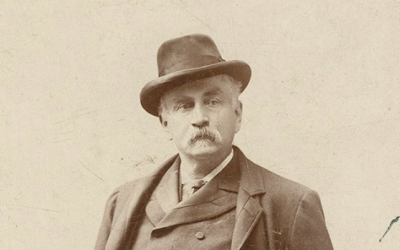The coming of the automobile necessitated construction of a network of roads across the state to accommodate motorists. Rural areas, especially in western Nebraska, often had difficulty in tackling such a costly task. The Nebraska Farmer of January 5, 1916, included several letters from readers concerned about the “big, expensive task of laying out and establishing public roads” in western Nebraska. H. J. Curtis of Garden County believed the effort and expense involved was justified:
“When you have a public road and it is in such condition that a man with a heavily loaded wagon can jog merrily along past your place without stopping to open gates, or to pry the wheels out of the mud or rest his team, that man is favorably impressed with your farm and your neighborhood. But when the teamster, the neighbor, or the tourist in his car finds your road practically impassable, he bellows in disgust: ‘I wouldn’t live on this place if that fellow made me a present of his farm.’
“We are told that the value of a business lot is determined by the number of people that pass it in a day. The same rule will apply to some extent to land in the country. By striving for the establishment of good roads the western Nebraska citizen is helping himself a great deal and the public more.”
Elsewhere in the same issue, Fred Stolley of Hall County wrote that city people and not farmers, were responsible for bad rural roads: “The heavy automobile is the main cause of bad roads. A $10 license fee would not be too much for heavy cars, and the proceeds should be applied to the roads in their immediate neighborhood on which the damage is done. . . .
“Furthermore, bad roads are considered a bad reflection upon the farmer adjacent to such roads. This was pointed out to me the other day by a city friend who felt highly aggravated because of the rough roads generally found in the country. He thought the farmers were responsible for this condition. I replied that it was quite the reverse; that it was the city people with their heavy cars traveling at a high speed that puts our roads in such condition.
“Then my friend explained that the chuck holes are the ruination of their fine cars, and I agreed with him. But I asked him why they didn’t adjust themselves to the prevailing conditions; that is, to have a lightweight car and carry a shovel along with which to fill up bad chuckholes when they find one, thus helping the other fellow as well as themselves.”



